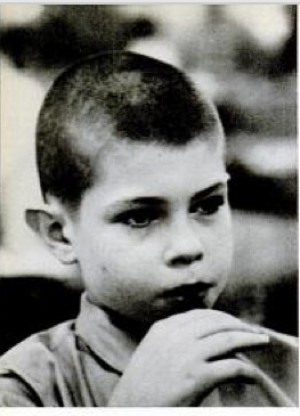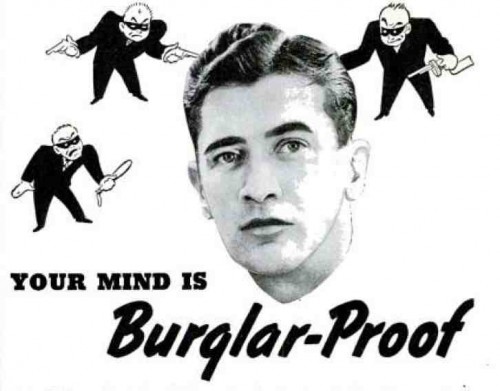Brain
WUvian Memory Test
This is a test to determine the percentage of WUviness you have coursing through your veins.So, in the comment section please use one word responses, YES if you get it or NO if you don't.
ATTEMPTED MURDER

Posted By: Expat47 - Fri Jul 19, 2013 -
Comments (93)
Category: Brain
Your Brain on Mescaline
In the early 1950s, German photographer Leif Geiges created a series of abstract images in order to try to portray "exactly what the mescaline subject sees and hears during the course of his artificial psychosis" — as Newsweek put it, which ran his images in its Feb 23, 1953 issue. This was before mescaline was made illegal, back when psychiatrists still believed that the experience of taking mescaline approximated the mental state of a schizophrenic and therefore could be of great experimental value.As for the mescaline imagery itself, Newsweek explained:

"Wallpaper patterns come to life, change to demoniac caricatures, threaten immediate destruction"
More in extended >>
Posted By: Alex - Tue Sep 18, 2012 -
Comments (12)
Category: Dreams and Nightmares, Drugs, Psychedelic, Photography and Photographers, Science, 1950s, Brain, Mental Health and Insanity
The Method of the Nail

I came across an unusual article titled "The Good Old Method of the Nail" in an old medical journal. (Unfortunately I can't find an online version of it.) The article details the history of killing people by driving nails into their brain.
Apparently the 'method of the nail' used to be quite a popular homicide technique, because in the days before x-rays it was hard to tell that someone had a nail in their head. The victim's hair might hide the wound, so people, not seeing any obvious sign of injury or foul play, would often assume death occurred from natural causes.
The method of the nail is such an ancient technique that it's mentioned in the Bible, Book of Judges 4:21:
It also pops up in Chaucer's Canterbury Tales, in "The Wife of Bath's Prologue," which includes a list of various ways wives kill their husbands:
Whyl that they slepte, and thus they han
hem slayn.
Nor is the nail-in-the-head just a western phenomenon. It also has deep roots in Chinese culture. From the article:
The point of these stories is always the same: the judge is baffled by the fact that although there are strong reasons for suspecting the wife, the body of the husband shows no signs of violence. The final discovery of the nail is elaborated in various ways.
The oldest version said that Yen Tsun found it because he noted that a swarm of flies congregated on one place on top of the dead man's skull...
In 1881, Stent recorded another version under the title 'The Double Nail Murders' in volume 10 of the China Review: When the coroner fails to discover any trace of violence on the victim's corpse, his own wife suggests to him that he look for a nail. When the judge has convicted the murdered man's widow on this evidence, he also has the coroner's wife brought to him, since her knowledge of such a subtle way of committing a murder seems suspicious to him. It transpires that the coroner is her second husband. The corpse of her first husband is exhumed, and a nail discovered inside the skull. Both women are executed.
The image at the top is an x-ray from a 1973 case, in which a man used a hammer to drive an awl into his wife's head, explaining that he did it to "exorcise the evil soul that had taken its place in her head."
Posted By: Alex - Sat Sep 08, 2012 -
Comments (6)
Category: Crime, Brain, Brain Damage
Mike Grost, Supergenius

This child is Mike Grost, as he appeared in a 1965 article in Life magazine. At the time, he was said to have an IQ of 200+.
Whatever happened to Mike? A 2005 interview from the MSU State News had this to say:
Michael Grost was only 10 when he began at MSU in 1964.
Grost declined comment for this story, but in a 2002 interview with The State News, the Southfield
resident described his life in college as similar to having "40,000 brothers and sisters."
Grost held his first job on campus working with computers his freshman year, which propelled him into
software design after his 13-year college career - five of which were spent at MSU. He also attended
Yale University and U-M, earning a doctorate degree in mathematics at age 23. Grost currently is a
system architect at a computer company in Detroit.
"I really owe (MSU) a lot for the huge chance they took on me as a kid," Grost said in the 2002
interview.
Gee, I don't know. Kinda underwhelming. Shouldn't he be a Silicon Valley zillionaire by now?
Even his home page is kinda lackluster.
Oh, well--maybe as a certified genius he knows that material success is a sham.
Posted By: Paul - Sun Jul 15, 2012 -
Comments (11)
Category: Children, 1960s, Natural Wonders, Brain, Child Prodigies
Autonomous Sensory Meridian Response, or Braingasms
The Autonomous Sensory Meridian Response (ASMR) Research & Support site defines the phenomenon as, "a physical sensation characterized by a pleasurable tingling that typically begins in the head and scalp, and often moves down the spine and through the limbs." Various stimuli can trigger the sensation -- certain kinds of sights, sounds, and situations. It's sometimes referred to as a "braingasm".I'm not sure whether ASMR is considered to be a scientifically verified phenomenon. Nevertheless, there's a sizable community of people who actively seek the sensation, and they post videos on youtube designed to trigger it. That's why, if you wade deep enough into the depths of youtube, you'll eventually come across a whole slew of odd ASMR-trigger videos, such as this one of the sounds of gift wrapping
I believe that the whisper videos I posted about yesterday are related to this ASMR phenomenon -- because whispering can be an ASMR trigger. That is, most people simply find it annoying to have to strain to hear someone whispering, but there are a few who are getting a tingly, braingasm feeling from it.
Posted By: Alex - Thu Apr 19, 2012 -
Comments (16)
Category: Emotions, Subcultures, Psychology, Brain
The Drugstore Hypnotist
Ralph Pearson's 15-minutes of fame came in 1951, when he briefly gained some notoriety as the Drugstore Hypnotist. He was a drugstore owner who hypnotized his customers, making them believe they were flying an airplane, or that they were the Statue of Liberty. This was in the days before CVS and Walmart, when people actually hung out and socialized in drugstores.

The Milwaukee Journal, May 18, 1951
Miami, Fla.—(AP)— A stranger walking into Ralph Pearson's drugstore any night in the week would be amazed at some of the antics there.
What would you think, for instance, if you saw a man flying an imaginary warplane, another at the soda fountain kissing a woman who wasn't there, and a girl posed as the Statue of Liberty.
Regular customers are never surprised, though. They know it's just Pearson practicing his hobby of hypnotism.
Besides having fun, Pearson accomplishes a lot of good by putting people in trances. He has cured several of the smoking habit, for example.
"I'm losing a lot of my cigarette business," he says. "But I don't mind. Most of the smokers I've cured are young people who should not be smoking, anyway."
One schoolgirl told Pearson she hated school.
"I hypnotized her and quietly suggested while she was in a trance that school was a good thing and she should enjoy it," he recalls.
"After I woke her up, I said, 'How's school going lately?'
"'Fine,' she said. 'I can't wait to go in the morning.'"
Pearson cured another schoolgirl of biting her fingernails. Another stopped drinking coffee after one session with him.
Pearson hypnotized one girl, told her she was the Statue of Liberty, and she held the pose for 15 minutes. After he woke her up, she said her arm wasn't even tired.
A young man who was about to lose his job because he overslept every morning now wakes up daily at 7 a.m. on the dot, Pearson claims.
"Too bad I can't hypnotized myself," the druggist added. "I stay up so late hypnotizing people, I'm too tired to get up in the mornings."
The druggist has attracted so much attention with his hypnotism, nobody watches the television set in his store any more.
"We'll either have to sell the store and go into the hypnotism business or stop this stuff," said Mrs. Pearson. "It's getting to be a three ring circus around here."
Posted By: Alex - Tue Mar 27, 2012 -
Comments (2)
Category: Hypnotism, Mesmerism and Mind Control, 1950s, Brain
The Braincar
The Braincar is the creation of artist Olaf Mooij. He drives it around during the day, while a camera on top of the brain records videos of his travels. Then, during the night, he plays back the videos by projecting them onto the inner surface of the brain. As if the brain were dreaming... (via technabob)
Posted By: Alex - Wed Feb 22, 2012 -
Comments (6)
Category: Brain
Mystery Ad

What product is being touted by this curious pronouncement?
Find out here.
Posted By: Paul - Thu Dec 01, 2011 -
Comments (6)
Category: Business, Advertising, Products, 1930s, Brain
Memory Aid?

This headline is too weird to be simply a headline. It must be a memory aid, like "ROY G. BIV" or "Every Good Boy Deserves Fun."
But what could the hidden meaning be?
Please submit your best guess.
Mine is "Lion Genomes Occupy Protoplasm Interiors Totipotentially Cancerous."
Article here.
Posted By: Paul - Mon Nov 21, 2011 -
Comments (5)
Category: Celebrities, Music, Body Fluids, Brain
Sleep Artist
The Man Who Draws in His Sleep
Article here.
Posted By: Paul - Fri Sep 02, 2011 -
Comments (6)
Category: Art, Psychology, Europe, Brain

| Who We Are |
|---|
| Alex Boese Alex is the creator and curator of the Museum of Hoaxes. He's also the author of various weird, non-fiction, science-themed books such as Elephants on Acid and Psychedelic Apes. Paul Di Filippo Paul has been paid to put weird ideas into fictional form for over thirty years, in his career as a noted science fiction writer. He has recently begun blogging on many curious topics with three fellow writers at The Inferior 4+1. Contact Us |




